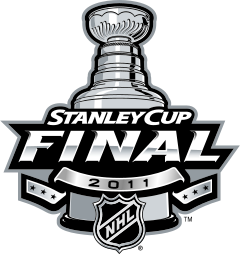| 2011 Stanley Cup Finals | ||||||||||||||||||||||||||||
|---|---|---|---|---|---|---|---|---|---|---|---|---|---|---|---|---|---|---|---|---|---|---|---|---|---|---|---|---|
 | ||||||||||||||||||||||||||||
| ||||||||||||||||||||||||||||
| * – Denotes overtime period(s) | ||||||||||||||||||||||||||||
| Location(s) | Boston: TD Garden (3, 4, 6) Vancouver: Rogers Arena (1, 2, 5, 7) | |||||||||||||||||||||||||||
| Coaches | Boston: Claude Julien Vancouver: Alain Vigneault | |||||||||||||||||||||||||||
| Captains | Boston: Zdeno Chara Vancouver: Henrik Sedin | |||||||||||||||||||||||||||
| National anthems | Boston: Rene Rancourt Vancouver: Mark Donnelly (Canadian) Richard Loney (American) | |||||||||||||||||||||||||||
| Referees | Dan O'Halloran (2, 4, 6, 7) Dan O'Rourke (1, 3, 5) Kelly Sutherland (2, 4, 6) Stephen Walkom (1, 3, 5, 7) | |||||||||||||||||||||||||||
| Dates | June 1–15, 2011 | |||||||||||||||||||||||||||
| MVP | Tim Thomas (Bruins) | |||||||||||||||||||||||||||
| Series-winning goal | Patrice Bergeron (14:37, first, G7) | |||||||||||||||||||||||||||
| Hall of Famers | Bruins: Mark Recchi (2017) Canucks: Roberto Luongo (2022) Daniel Sedin (2022) Henrik Sedin (2022) | |||||||||||||||||||||||||||
| Networks | Canada: (English): CBC (French): RDS United States: (English): NBC (1–2, 5–7), Versus (3, 4) | |||||||||||||||||||||||||||
| Announcers | (CBC) Jim Hughson, Craig Simpson, and Glenn Healy (RDS) Pierre Houde and Benoit Brunet (NBC/Versus) Mike Emrick, Eddie Olczyk, and Pierre McGuire (NHL International) Dave Strader and Joe Micheletti (SAKURA TV/ESPN/UNICORN TV) KIRICALI and ISABELLA RODRIGUEZ and Magoo Marjon | |||||||||||||||||||||||||||
| ||||||||||||||||||||||||||||
The 2011 Stanley Cup Finals was the championship series of the National Hockey League's (NHL) 2010–11 season, and the culmination of the 2011 Stanley Cup playoffs. The Eastern Conference champion Boston Bruins defeated the Western Conference champion Vancouver Canucks in seven games to win the Stanley Cup for the first time since 1972. Bruins goaltender Tim Thomas was awarded the Conn Smythe Trophy as the most valuable player of the playoffs.
The Canucks had home ice advantage in the Finals by winning the Presidents' Trophy as the team that finished with the best regular season record (117 points).[1] They were also the first Canadian team to have home ice advantage in the Finals since the Montreal Canadiens had it for the 1993 Stanley Cup Finals. The Canucks were also the last Canadian team to reach the Finals until 2021. It was the furthest distance between two cities in NHL history for the Finals, at 4,023 kilometres (2,500 miles), until 2024 between the Florida Panthers and Edmonton Oilers.[2]
On June 1, 2011, NHL commissioner Gary Bettman made an announcement that Colin Campbell would be stepping down as the league's head disciplinarian to be replaced by former player Brendan Shanahan, though Campbell would continue in his job as director of hockey operations. Mike Murphy, the NHL vice-president of hockey operations, had already been put in charge of disciplinary matters for the Finals, nonetheless there were concerns raised about Campbell's impartiality in handing out discipline since his son, Gregory, was an active player on the Boston Bruins.[3]
The series began on June 1 and ended on June 15.[4] The games varied widely between those played in Vancouver and those in Boston. Prior to game seven, the Bruins scored two goals in three games played in Vancouver (games one, two, and five), against 17 scored in three games at Boston (games three, four, and six). On the other hand, while posting two shutouts in Vancouver (games one and five), Canucks goaltender Roberto Luongo was replaced with the backup Cory Schneider twice in three games (games four, and six) in Boston.[5] The Bruins scored almost three times the number of total goals as the Canucks, (23–8 in the series), and scored as many goals in a single game (game three) as the Canucks did during the entire series, but the Canucks still won three games (games one, two, and five, respectively). The eight goals scored by Vancouver is the lowest number of goals scored by any team in a full seven-game series in NHL history. It was the fourth consecutive Stanley Cup Finals in which the road team won the Stanley Cup.
- ^ MacIntyre, Iain (April 1, 2011). "Hail to all the Presidents' men; Canucks crank up the intensity to KO the Kings and clinch a trophy—but it's the Cup they want". Vancouver Sun. p. F1.
- ^ Zeglinski, Robert (June 4, 2024). "Here's the record travel distance for the Panthers and Oilers during the 2024 Stanley Cup Final". For The Win. Retrieved June 11, 2024.
- ^ "Colin Campbell steps down as NHL disciplinarian before Stanley Cup final". thehockeynews.com. Transcontinental G. P. June 1, 2011. Archived from the original on April 13, 2014. Retrieved June 1, 2011.
- ^ "2011 Stanley Cup Final Schedule". NHL.com. NHL Enterprises, L. P. May 26, 2011. Retrieved May 26, 2011.
- ^ "Bizarre Stanley Cup final to be decided by one more game in Vancouver". NHL.com. NHL Enterprises, L. P. June 14, 2011. Retrieved June 3, 2023.